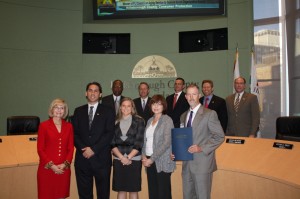Published: December 14, 2011 Updated: December 14, 2011 – 8:00 AM
Tea party activists in Hillsborough County have a new burr under their more-liberty, less-government saddles: county crony capitalism.”CCC” is the term the Tampa Tea Party and the related Tampa 912 Project are applying to county commissioners who want to renegotiate residential garbage contracts with the county’s three current haulers. Instead, the conservative activists think the county should open bidding to any qualified company.
“We believe competition and the free market ensure that citizens get the best services at the best price,” said Sharon Calvert, founder of the Tampa Tea Party. “This doesn’t eliminate the current providers. They just need to put their bids in. But they have to know they’re up to competition.”
The new contracts, which would take effect in 2013, will be worth about $60 million to haulers with the winning bids. The high stakes have generated pressure from both sides that has escalated in recent months. A public relations company representing the current contract holders — Waste Management, Republic Services and Waste Services Inc. — started a Facebook page called “Leave Our Trash Service Alone.”
The page claims the current haulers have a 99 percent satisfaction score with relatively low rates. A photo panel shows overflowing garbage defacing suburban sidewalks, implying that service will decline under new vendors.
Public records show lobbyists representing the three franchise haulers or Waste Pro, the main challenger to the current system, visited county commissioners 59 times this year.
The lobbyists or the waste companies they represent contributed $4,500 this year to two commissioners’ campaigns: $3,000 to Al Higginbotham and $1,500 to Kevin Beckner. Both commissioners favor opening the system to new bidders. Higginbotham got $2,000 from the franchise haulers, and Beckner received $1,000 from those companies.
Higginbotham, Beckner and Commissioner Mark Sharpe favor seeking bids. Chairman Ken Hagan and commissioner Victor Crist were leaning toward renegotiating with the franchise haulers, though Crist said Monday he is keeping an open mind.
“Part of me says throw it in the air and see what lands,” Crist said. “On the other hand, everybody’s been happy with what we have. You could change to something and it’s not very good and nobody will be happy with it.”
Commissioners Les Miller and Sandra Murman said Monday they were undecided. Murman ran an Internet survey of residents who have communicated with her office on various subjects. Out of 185 respondents, 158 said they were satisfied with current garbage pickup. But 124 respondents said the county should open contracts to new bidders, while 33 favored renegotiating with the current haulers, and 21 said to do both.
Red-shirt wearing Tea Party members plan to pack commission chambers for the discussion at 1:30 today. The group is offering a free bus ride at 11 a.m. from Apollo Beach.
